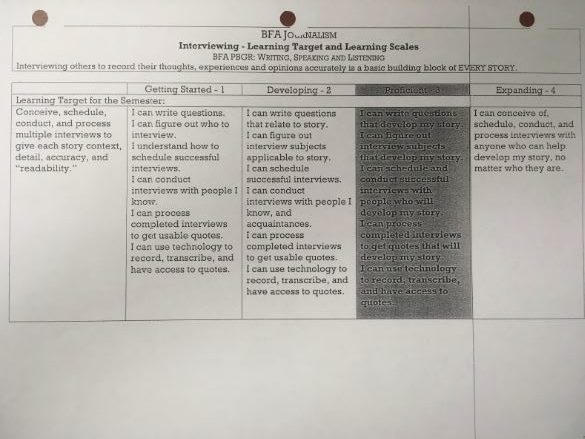Expanding on proficiency-based grading
November 6, 2018
A few years after the first implementation of proficiency-based grading at BFA, the system has seen massive evolution from the past ways of traditional grading.
In many ways, this new system picks up focus on areas often misrepresented by traditional grades, mainly on the subjects of academic growth and effort, according to the New England Secondary School Consortium.
With this shift in focus, major changes can be seen across the school and across classrooms. Everything from the measure of grades changing from percentages to the one- two-three-four system, the lack of GPAs, to how new “transferable skill” grades such as Self Direction and Responsible and Involved Citizenship are now being shown.
Shannon Warden, Assistant Principal for Curriculum at BFA has witnessed such changes.
“I think many or most assessments have changed, and what teachers are assessing in the shift of proficiencies for many or most content areas is really a focus on skills in that area to access the knowledge, so a lot of assessments now are not just about memorization, there are some of those because that’s important for learning development, so that’s a piece, but often at the end you will notice many teachers are giving more performance based assessments and tasks to see that you’re able to apply the knowledge that the things you memorized with the skills you’ve learned to then apply that to situations. So I think that is a shift we’re really starting to see in classrooms and that’s taken time to develop and that those are aligned with rubrics and that there’s clarity around what students are being taught and then what they’re being assessed and then what do they know? What do they not know? What do they need to work on?” Warden said.
Another massive change that proficiency-based grading brings to the table is the ability for students to redo or retake most assignments until they score a “proficient” grade, represented by a three, or a four, an “expanding” grade. This has even caused a revamp of our schedule, adding additional enrichments to the week in order to give students time to retake any non-proficient assignments or assessments.
This change in schedule was another change for good, according to Warden.
“Because you’re allowed to redo/retake things, that’s why we added that additional enrichment time so that’s another positive change that we’re seeing. So I think that shows up in classrooms as well that systems within the classrooms have changed around just in general how teachers do business around doing school because we’re allowing kids to redo things and retake things and some kids may be working on this and some kids may be working on that,” Warden said.
Even in the midst of so much positive growth, there is lingering concern that out of state or out of country colleges who do not use proficiency-based grading will not accurately assess students’ eligibility for admission due to the lack of GPAs and the one, two, three, four system of measurement. Preston Randall, Guidance Director at BFA, who oversees students’ futures beyond our high school dispelled any legitimate concern one should have.
“How the colleges do their grading, often times traditional grades, has nothing to do with the admissions process. The admissions folks aren’t giving grades, that’s what the professors are doing…. I think that’s an important distinction. What the college admissions process is really looking for is evidence about whether or not the student can be successful at their college, first and foremost…. When it comes to a GPA, colleges have always recalculated whatever GPA we gave them to their own weighting system of GPAs so that whether you went to MVU or BFA or to San Diego Public High School, they’re calculated the same way…. They’re used to getting very different kinds of transcripts,” Randall said.
Another recent source of concern has been rumors of schools statewide reversing back to traditional grading, but Warden has no knowledge of any kind of credibility to these rumors.
“In my circle I have not heard of any schools going back. What I have heard is worry that there was a change in leadership with the new Vermont Secretary of Education in concern that there would be continued support for proficiency based learning. The other school level and district level educational leaders that I have spoken to that have made the shift to proficiencies have no interest in going back, so if there are any that are, I haven’t heard,” Warden said.
In addition to this, Randall would like students and families to know that there will be a meeting held after school with college admissions counselors to alleviate any other concerns they have for their or their children’s futures.
“On November 8th at 6:30 pm in the PAC we’re going to have admissions folks from the University of Vermont, Castleton University, Clarkson University, and St. Michael’s College to talk about exactly that [how proficiency grades are viewed by colleges who use the traditional system], and families might enjoy hearing directly from the colleges as there will be opportunity to ask questions and get answers. There will also be a recording [of the meeting] available on the internet,” Randall said.

